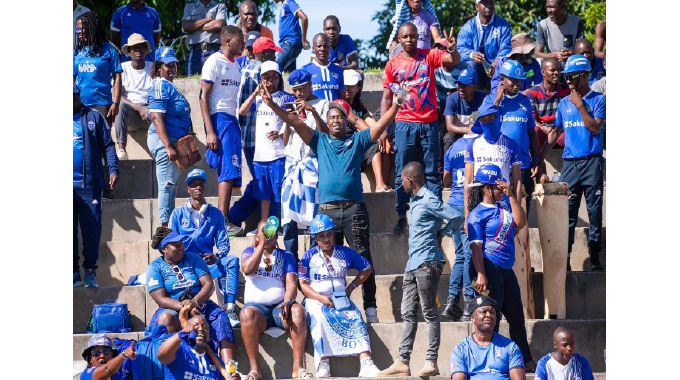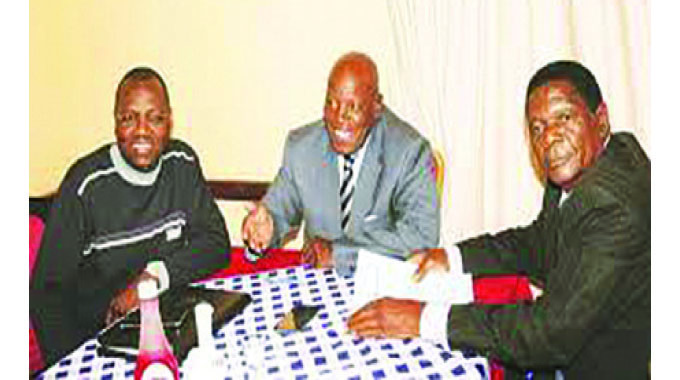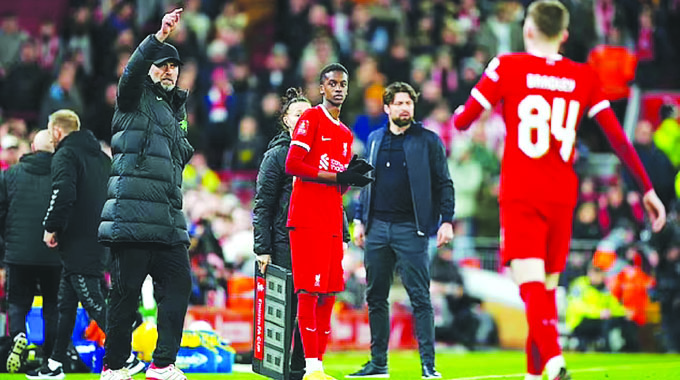Sharuko on Saturday: Some people think football is a matter of life and death, I can tell you, there are many things much more important than this game

DESERTED streets, deserted schools, deserted pubs, deserted churches, deserted stadiums and deserted parks, just like a scene borrowed from those post-apocalyptic movies.
Big cities reduced into ghost towns, as if some alien invasion of Earth occurred overnight, the fears, the tears, the dead and the dying.
A world in lockdown, being devoured by something that came from out of the blue, some kind of deadly flu, so contagious it has made a mockery of borders, plunging the globe into a state of disorder.
It has tamed stock markets, hammered pay packets, in a way reminiscent of the Great Depression, battered sport in a way reminiscent of the World War II destabilisation.
Shattering hope, sowing confusion as if we are all high on some kind of dope, triggering panic, the rising number of the dead and dying, showing this is not any picnic.
It was never supposed to be like this.
Surely, not in the year we were celebrating the Golden Jubilee of the last time we watched Pele at the World Cup finals.
Fittingly, he provided the farewell moment for that World Cup — an assist into the path of Carlos Alberto, without the need of vision to pick out his charging teammate, for the fourth and final goal for the Brazilians.
The greatest national football team ever assembled, the Brazil of the ‘70 World Cup and, in the Mexican sunshine, the magical sum of their parts — Pele, Carlos Alberto, Jairzinho, Rivelino, Gerson and Tostao — came together.
Even fate appeared to be smiling because, for the first time, the World Cup was broadcast in colour on television.

LAST TIME IT HAPPENED . . . Zimbabwe international goalkeeper, Bruce Grobbelaar (left), and teammate Glen Hysen celebrate winning the English league title in 1990, the last time the Reds were at the summit of the game in England.
This was supposed to be about the Paris Saint Germain Golden Jubilee celebrations, 50 years of the New York Marathon and 50 years after the birth of legendary Aussie fast bowler Glenn McGrath.
And, oh by the way, Dynamos won their third league title 50 years ago.
Of course, this was also supposed to be the week the domestic Premiership was set to start — celebrating 40 years of top-flight football in Zimbabwe.
An adventure that has produced a CAF Champions League finalist and semi-finalist, both achievements secured by DeMbare and a CAF Cup of Cup Winners semi-finalist.
A quarter-of-a-century since Blackpool went on that romantic adventure across the continent, in their debut CAF inter-club campaign, and reached the last four of the Cup of Cup winners tourney.
They call it the Confederation Cup today and that is not bad for a league that is one of the most under-funded top-flight football entities in the world.
A league whose clubs usually collapse because of financial difficulties, and which loses every decent footballer to even the lightweights of the South African Premiership.
AND, JUST LIKE THAT, THE SHOW CAME TO AN END
The football gods also appeared to have come up with a perfect script for the celebrations — Liverpool will ending 30 years of waiting, for the league title, by winning it at Everton on Monday.
Liverpool were the dominant English club, by the time domestic football emerged from international isolation, with the advent of Independence, in 1980.
Oh, by the way, Dynamos also won the league again that year and so they could also celebrate 40 years since they became the first league champions in Independent Zimbabwe.
Highlanders, too, were meant to celebrate 30 years since they cane or age and won their first league title, back in 1990, and 20 years since they became the first champions of the new millennium in 2000.
The arrival of former Bosso goalkeeper, Bruce Grobbelaar, at Anfield on March 17, 1981, provided the people of this country with a reason to find an attachment with the Reds, and that they won league and European titles, made that relationship fashionable.
But, that army of fans, which includes my colleagues — Barry Manandi, Mike Madoda, Maxen Karombo, Major Tikiwa, Lewis Matindife, Cosmas Nyachiya, Dallas Sekawawana, Spencer Manguwa, Musa Gwasira, Henry Muriritirwa, Elvis Tauzeni, Themba Damiyano, Kenny Nzou — have not watched their beloved Reds lift the league title in the era of the English Premiership.
The closest they came to glory, Steve Gerrard slipped at Anfield, delivering them from the gates of heaven to the ugly chambers of hell.
They would probably have been champions today, had the league not been suspended.
But, what I find ridiculous, and even irritating, is that we even have the audacity to discuss whether Liverpool’s excellent season should, or should not, result in them being champions.
I find it inhumane that, at this point when the world is at a crossroads, we even find time and energy — driven by a toxic combination of our selfish and foolish interests — discussing the possibilities and probabilities, of the Reds being champions.
Even when it’s very clear that football ceased to be important the moment countries around the world started closing their borders, going into lockdown, isolating themselves.
When it’s clear football ceased to be important the moment global leaders started coming out to say coronavirus was a threat, like none we have faced before.
In a world where people are being told you can’t go to church, you can’t go to a wedding, and you can’t even go to a funeral, football loses its meaning.
In a world where the funeral of former Welsh rugby star, Matthew J Watkins, is to be streamed online, because of the coronavirus pandemic, football loses a meaning.
And, to lower ourselves, to discuss whether or not Liverpool should be declared champions, in such a crisis, is an insult to the brave men and women, at the frontlines, putting their lives at risk to try and save the world.
Those great men and women in the trenches, fighting for us, to live another day.
To spend our time, discussing whether or not Liverpool should be declared champions, is a brutal reminder of our selfishness, a testimony of our fascination with things that should be pushed into the backyard, our obsession with the trivial, even in times of Armageddon.
That Liverpool were the best team in England this season will only be questioned by those who live on Jupiter and have been drinking so much, all season, they don’t even know Winky D dropped a song dominated by lyrics about Ijipita.
That they deserve to be champions, is known by everyone who has a clue about what football is all about, including some die-hard Manchester United fans like me.
Even if they cancel the season today and declare it null and void, everyone knows who the league champions in England were this campaign and any attempts to argue otherwise is an insult to intelligence.
And, at times, you don’t need to be officially handed the title for you to be celebrated as the best.
Hopefully, the Reds will get to complete the formalities of being champions, for the first time in 30 years.
And, the good thing is that the clubs have decided that, at some point in the coming months, the league will have to be completed.
It’s a story with a conclusion some other day.
But, just like the DeMbare celebrations, marking 40 years after becoming the first champions of Independent Zimbabwe, and the Bosso celebrations, marking 20 years since becoming the first champions of the new millennium, the party should be put on hold.
Because, right now, football isn’t important and how I wish Billy Shankly, the great Liverpool manager, was alive today to realise he was wrong when he famously said “some people think football is a matter of life and death, I assure you it’s much more serious than that.”
No Bill, there are many things more serious than football.
WHEN EAST AFRICA FACED ARMAGEDDON IN THE 80’s THE WORLD SHOWED US THE WAY
Those of a certain age probably still remember these lyrics, from a song penned during times of strife, for a cause as powerful, and important, as they come.
“There comes a time when we heed a certain call,
When the world must come together as one
There are people dying
And it’s time to lend a hand to life
The greatest gift of all
“We can’t go on pretending day by day
That someone, somewhere, will soon make a change
We’re all a part of God’s great big family
And the truth, you know
Love is all we need
“We are the world
We are the children
We are the ones who make a brighter day
So, let’s start giving
“There’s a choice we’re making
We’re saving our own lives
It’s true we’ll make a better day
Just you and me”
Thirty five years ago, on March 8, 1985, the song, “We Are The World,” was released by a galaxy of American musicians, led by Michael a Jackson and Lionel Ritchie, under the banner, “USA For Africa.”
It reminded us of who we are, God’s children, and when one of us faces a crisis, we have to come together and fight in one corner to ensure we try and defeat the enemy.
The song was done to raise funds for the global relief efforts to fight the great famine which hit Ethiopia between 1983 and 1985.
The famine left, at least, 1.2 million people dead, 2.5 million people displaced, more than 200 000 children as orphans and more than 400 000 refugees.
But Michael Jackson and his colleagues didn’t waste their time talking about the sinking NASL, the American top-flight football league which was facing financial challenges, and eventually collapsed in 1984.
The same league which had brought Pele, Franz Beckenbauer, Johan Cruyff, Johan Neeskens, Gerd Muller, Jomo Sono and George Best to play in the United States.
They came together and sang for the millions who were dying, not for the New York Cosmos, whose franchise was collapsing, despite having attracted Pele to come and play in the United States, and they raised about US$150 million.
That’s the challenge we face today, to defeat the monster called coronavirus, because Liverpool will certainly have their time — once this invisible enemy is defeated — to be crowned champions of England this season.
It’s a title they deserve, and no one can take that away from them, it’s only that this isn’t the time to talk about it.
Maybe, the world has changed from 1985, when the likes of Michael Jackson and his colleagues, really cared about what matters most and, in just one heroic act, found a way to help the starving people of Ethiopia.
Probably, it’s something to do with this year, and music fans will tell us this is also the 50th anniversary of the year the music died.
Legendary American musician, Jimi Hendrix, died at the age of 27 on September 18, 1970.
And, more importantly, the Beatles released their 12th and final album, “Let It Be,’’ on May 8, 1970, just a month after the group’s break-up.
Yes, because from a distance, God is watching us.
And, in times like this, football — including whether or not Liverpool should be declared champions — can take a back seat, at least, for now.
To God Be The Glory!
Peace to the GEPA Chief, the Big Fish, George Norton and all the Chakariboys in the struggle.
Come on United!!!!!!!!!!!!!!!!!!!!!!!!!
Bruno, Bruno, Bruno, Bruno, Bruno, Bruno!
Text Feedback — 0772545199
WhatsApp — 0772545199
Email — [email protected], [email protected]







Comments